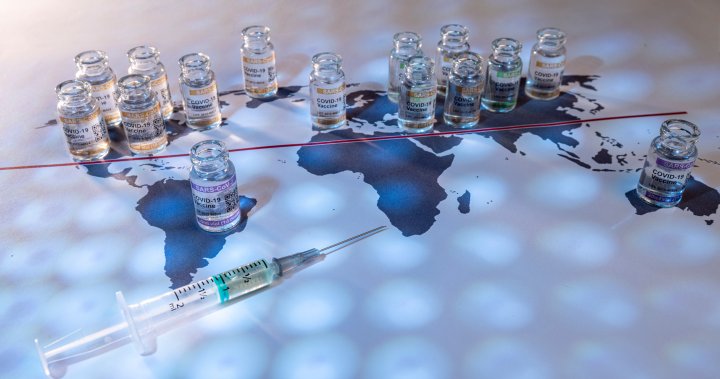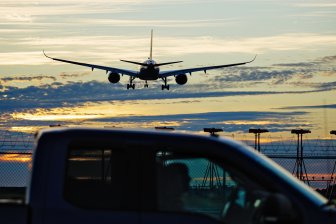Boosters help fight COVID-19, experts say. But are they the pathway out of the pandemic? – National | Globalnews.ca
As provinces expand their COVID-19 booster eligibility to respond to the Omicron variant, experts are warning Canada not to lose sight of the long-term pathway out of the pandemic: global vaccination efforts.
Ontario announced on Thursday that, come mid-December, boosters will be available to Canadians aged 50 and up, roughly six months after their second dose. But according to a World Health Organization advisor, we don’t actually know if boosters are even necessary as of yet.
“We don’t know at this point whether Omicron will affect the efficacy of vaccines, but we will find out soon and we’re working on those answers,” Dr. Peter Singer said in an interview with Global News.
“This is a bit like the fog of war. The early reports are not necessarily reliable or accurate. So the best thing we can do is be patient and be prudent.”
Read more:
Ontario expands eligibility for 3rd COVID booster shots to those aged 50 and older
Meanwhile, Singer said, there were 48,000 COVID-19 deaths reported around the world last week — and the actual death rate might be “two to three times as high.”
“The priority really should be on primary doses for people at highest risk who are the most vulnerable in every country in the world,” Singer said.
But as Singer and other experts call on rich countries to share their vaccine stockpiles, Western countries are reckoning with studies that indicate the efficacy of COVID-19 vaccines might begin to wane after six months.
That’s a deadline more than 10 million Canadians will reach by the new year.
“The National Advisory Committee on Immunization (NACI) is actively reviewing available evidence from Canada and other countries, and will be providing updated advice on booster doses,” a spokesperson for Health Canada told Global News in an emailed statement.
“NACI considers variants of concern throughout their deliberations, and this will be a consideration for their booster program advice.”
The WHO has warned that the global risk from Omicron is “very high,” with early evidence suggesting it might be more contagious than other variants of concern.
The variant has a number of mutations in two key areas of the virus’s spike protein, according to chief public health officer Dr. Theresa Tam, including in areas that could increase transmissibility, and in areas that could impact the immunity offered by vaccines.
Read more:
Omicron variant — Canada expands travel ban, seeks booster guidance
Generally speaking, there’s “no question” that a third COVID-19 vaccine dose is “very, very useful in boosting immunity,” according to Dr. Gerald Evans, an infectious disease specialist at Queen’s University in Kingston, Ont.
The immunity conferred by a third COVID-19 vaccine dose, Evans added, “will probably cover most variants, including potentially Omicron.”
“That will help you at a very local level to control things should Omicron, for instance, demonstrate some evidence of vaccine escape,” he said.
That’s because booster shots offer your immune system the chance to “fine-tune antibodies it makes in response to vaccination,” Evans explained, which should strengthen your body’s ability to fight off the virus if you’re exposed to it.

However, there’s a lot we still don’t know about the Omicron variant, according to Evans.
“Evidence that’s emerging is suggesting that we really need to sort of ratchet down our worries and concerns. It appears that it causes mild infection or mild disease … and it certainly appears at the moment that vaccine offers protection,” Evans said.
“This is very early and very speculative, but people need to kind of just take a deep breath and kind of relax about these things while we wait to find out more information.”
Experts call for more vaccine sharing
Even if boosters do prove to be an effective tool against this particular variant, experts warn that new, potentially dangerous variants will continue to emerge until every country around the world has high vaccination rates.
“The real way out of this … is we need to have vaccine rollout globally, and we need to have vaccinations globally rise to levels that we’re seeing in parts of the developed world,” said Evans.
That’s because the virus “takes advantage of widespread infections, which causes viral replication, which allows it to mutate,” according to Evans.
Those mutations can sometimes be advantageous for the virus, for example, by making it more transmissible, or teaching it to evade vaccines, according to multiple public health experts. The more COVID-19 spreads, the more replication occurs — and the more chances spring up for a serious mutation to take hold.
“In and across Africa, the vaccination rate is seven per cent — seven per cent compared to about 70-plus per cent in Canada,” said Singer.
“That’s a breeding ground for variants.”
Read more:
Travel restrictions and Omicron — What’s changing in Canada, U.S.
Kerry Bowman, a bioethicist at the University of Toronto, has been working on the ground in various countries with low vaccination rates. Speaking to Global News from Al Ghaydah, Yemen, Bowman said that without more vaccines, the global death rate from COVID-19 is going to be “phenomenal.”
“I have seen unvaccinated health-care workers. I’ve seen people that need oxygen and aren’t getting it, in very impoverished countries, and they have not received the vaccine. These people are going to die,” he said.
To date, there have been over 263 million COVID-19 cases worldwide. More than five million people have died, according to the WHO.
“South Africa itself may have a lot of vaccines right now, but sub-Saharan Africa absolutely does not. And Canada has focused relentlessly on boosters and vaccinating children,” Bowman said.
“The greatest threat to us all as Canadians has always been the international pandemic situation, and we have done next to nothing about that.”

Even if there are some logistical hurdles when it comes to getting vaccines into arms in certain countries, Singer said leaders should not use that as an excuse to withhold the 450 million vaccine doses that are still needed around the world in order to achieve WHO targets.
Those targets call for 40 per cent of the population of every country to be vaccinated by the end of this year, and 70 per cent by mid-2022.
“In every country in the world, there are issues of delivery. There are issues of hesitancy,” Singer said.
“We don’t say in Canada or in the United States, ‘there might be some vaccine hesitancy’ or ‘delivery might be difficult to a particular community, therefore, maybe we shouldn’t provide the supply.’ That’s not the logic we use here, and it’s not the logic we should use anywhere else.”
Bowman said wealthier nations are welcome to provide boosters to their citizens provided they ensure other countries are getting their fair share of doses, too. But the problem is, Bowman said, “we’re not doing both. We never were doing both.”
“We’re doing almost nothing when it comes to global (vaccine supply),” he said.
Read more:
Canada finds first cases of Omicron COVID-19 variant in Ontario. Here’s what we know
Canada has committed to donating the equivalent of at least 200 million COVID-19 vaccine doses to the COVAX Facility — a global vaccine-sharing initiative — by the end of 2022, a government website says.
“This includes over 50 million vaccine doses procured by Canada that were determined by Health Canada to be in excess of our domestic needs, plus financial support to COVAX for the procurement and delivery of doses,” it read.
“Over 8.3 million surplus vaccine doses have been delivered so far through the COVAX Facility. Canada has also shared 762,080 AstraZeneca doses through direct, bilateral arrangements with countries in Latin America and the Caribbean.”
But Bowman says these efforts aren’t enough.
“When this awful pandemic eventually ends and the books are written and the analysis really begins,” he said, “Canada has to live with this legacy that we did very, very, very little from a global point of view at the height of this crisis.”
© 2021 Global News, a division of Corus Entertainment Inc.
For all the latest health News Click Here




